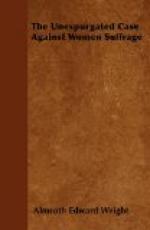But one knows that woman will rise and respond to the call of any strong human or transcendental personal affection.
Again, it is only a very exceptional woman who would, when put to her election between the claims of a narrow and domestic and a wider or public morality, subordinate the former to the latter.
In ordinary life, at any rate, one finds her following in such a case the suggestions of domestic—I had almost called it animal—morality.
It would be difficult to find any one who would trust a woman to be just to the rights of others in the case where the material interests of her children, or of a devoted husband, were involved. And even to consider the question of being in such a case intellectually just to any one who came into competition with personal belongings like husband and child would, of course, lie quite beyond the moral horizon of ordinary woman.
It is not only the fact that the ideals of abstract justice and truth would inevitably be brushed aside by woman in the interests of those she loves which comes into consideration here; it is also the fact that woman is almost without a moral sense in the matter of executing a public trust such as voting or attaching herself to a political association with a view to influencing votes.
There is between man and woman here a characteristic difference.
While it is, of course, not a secret to anybody that the baser sort of man can at any time be diverted from the path of public morality by a monetary bribe or other personal advantage, he will not, at any rate, set at naught all public morality by doing so for a peppercorn. He will, for instance, not join, for the sake of a daughter, a political movement in which he has no belief; nor vote for this or that candidate just to please a son; or censure a member of Parliament who has in voting on female suffrage failed to consider the predilections of his wife.
But woman, whether she be politically enfranchised as in Australasia, or unenfranchised as at home; whether she be immoral in the sense of being purely egoistic, or moral in the sense of being altruistic, very rarely makes any secret or any shame of doing these things.
In this matter one would not be very far from the truth if one alleged that there are no good women, but only women who have lived under the influence of good men.
Even more serious than this postponement of public to private morality is the fact that even reputedly ethical women will, in the interests of what they take to be idealistic causes, violate laws which are universally accepted as being of moral obligation.
I here pass over the recent epidemic of political crime among women to advert to the want of conscience which permits, in connexion with professedly idealistic causes, not only misrepresentations, but the making of deliberately false statements on matters of public concern.
It is, for example, an illustration of the profoundly different moral atmospheres in which men and women live that when a public woman recently made, for what was to her an idealistic purpose, a deliberately false statement of fact in The Times, she quite naively confessed to it, seeing nothing whatever amiss in her action.




